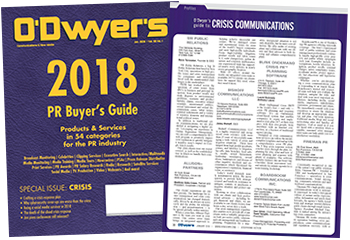|
|
Take, for example:
The sexual misconduct allegations against film executive Harvey Weinstein have not only ended his career, but also exploded into a proposed class action lawsuit against Weinstein, Miramax and former board members of Weinstein Co.
|
|
Under Armour Founder Kevin Plank has been vilified for both voicing his support of President Trump and also for resigning from the President’s manufacturing council. The business recently reported its first quarterly sales decline as a public company and suffered the departure of its CFO, co-Founder, Chief Marketing Officer and leaders of three divisions.
The NFL has seen television ratings drop and Commissioner Roger Goodell criticized by all sides in the wake of player protests during the national anthem. While the league has struggled to present a cogent response, nearly two-thirds of Americans who say they support the President view the NFL unfavorably.
We’re living and working in an era of unprecedented political and social volatility. The old crisis playbook no longer applies because today’s reputational emergencies can quickly scale to existential threats. Any marketing or sponsorship program has the potential to spark a backlash. Just ask Dannon, which recently had to fire yogurt spokesperson Cam Newton after the NFL star made derogatory comments toward a female journalist.
The coffee catastrophe
Traditional PR crisis plans that communicators have come to rely upon are no longer worth the price of the three-ring binders that hold them. A crisis that just a few years ago might have been limited to a company’s customer base now immediately spreads via social media to the politically polarized masses. These people may have never even heard of the brand, but the passionate opinions they share on social can make or break its corporate image.
Some communicators are better prepared than others at navigating this dangerous landscape. Those at Kuerig may not have been in November, when Fox News host Sean Hannity questioned the veracity of sexual misconduct allegations against U.S. Senate candidate Roy Moore. Liberal activists responded by calling on Hannity’s advertisers to pull their dollars from the show. Keurig announced it was doing so simply by responding to an activists’ tweet.
A reputational firestorm erupted, when Hannity fans called for a Kuerig boycott on social media and posted videos of them destroying their coffee makers. Traditional media followed social, exacerbating the problem. The New York Times even questioned why liberals would be offended at the destruction of coffee makers that pollute the environment.
Alternatively, Ford skillfully handled a potential crisis in early 2017. As President Trump campaigned, he slammed the company for outsourcing U.S. jobs. When Ford shelved plans to build a factory in Mexico and invest $700 million in Michigan, many observers assumed it was to avoid trouble from Trump. To prevent a crisis, Ford CEO Mark Fields proactively went to his top-tier media contacts to explain that the Michigan move had nothing to do with politics. It was simply a response to a drop in demand for small cars.
Finding your North Star
Amid this tornado of instant boycotts and fake news, how can communications leaders prepare the organization? They should start by guiding the company to identify its corporate purpose, the higher reason why the organization exists and how it serves the world at large beyond generating revenue and return for shareholders.
This purpose, or North Star, becomes the guiding principle the C-suite and employees can rally around and leverage to respond to political and social controversies. That North Star should be vetted against the values of constituents both inside and outside the organization.
For example, an agricultural conglomerate that employs immigrant field workers might love the concept of a diverse and inclusive America with open borders. But what if its largest produce buyers are supermarkets in red states that prioritize jobs for U.S.-born labor? Communications leaders need to be aware that their North Star could alienate some members of their value chain.
But identifying and articulating a purpose is critical because audiences expect CEOs to speak out. In fact, 75 percent of Millennials and 68 percent of Baby Boomers expect their employer to take a stand on important political and social issues, according to Glassdoor. A larger majority (84 percent) feel companies have a key voice in proposed laws, regulations and executive orders that might impact the company or employees.
Executing a plan
Having found their North Star, communications pros should then gather their executive counterparts from the C-suite, legal, human resources, investor relations and other functions to scenario plan all possible issues on which the company should have a POV: immigration, tax reform, gender equality, LGBTQ rights, freedom of speech and others.
This council also must dive into what potential reputational hot buttons exist in our volatile society: What political contributions have executives made? Are there any ties to NFL teams, players, venues or sponsors? Has the organization settled any sexual harassment claims? The goal should be a plan that addresses all possible problems with responses based on the company’s North Star and its commitment to living its purpose every day.
Tactically, such a plan needs to spell out which platforms and channels the brand should use to reach each audience, from digital and social to traditional media. It should also dictate how quickly the brand should respond; on Twitter, for example, a response should occur in a matter of a few minutes. The plan should be stress-tested on a periodic basis using simulated crises.
For PR pros, the job is more challenging than ever, with reputational risks lurking around every corner. But these challenges also bring opportunities for savvy leaders. By doubling down on their organization’s North Star and utilizing it to drive proactive crisis planning, PR pros can also grow their standing within their company. Strategic crisis communications that turns C-suite executives into true advocates for change are the key to the future for every corporate communicator.
***
Jackie Kolek is partner and managing director at Peppercomm.

 Jackie Kolek
Jackie Kolek

 There’s a fine line between newsjacking and taking advantage, aka ambulance chasing. Our job as PR professionals is to tread it carefully.
There’s a fine line between newsjacking and taking advantage, aka ambulance chasing. Our job as PR professionals is to tread it carefully. PR firms need to be mindful of ways their work product may be protected by the attorney-client privilege whenever working with a client’s internal legal team or its external legal counsel.
PR firms need to be mindful of ways their work product may be protected by the attorney-client privilege whenever working with a client’s internal legal team or its external legal counsel. Manuel Rocha, former US ambassador and intenational business advisor to LLYC, plans to plead guilty to charges that he was a secret agent for Cuba.
Manuel Rocha, former US ambassador and intenational business advisor to LLYC, plans to plead guilty to charges that he was a secret agent for Cuba. CEO mentoring is an often-overlooked aspect of why CEOs are able to make good decisions, and sometimes make bad ones—all of which intersects with the role and duties of a board.
CEO mentoring is an often-overlooked aspect of why CEOs are able to make good decisions, and sometimes make bad ones—all of which intersects with the role and duties of a board.  How organizations can anticipate, prepare and respond to crises in an increasingly complex world where a convergent landscape of global challenges, threats and risks seem to arrive at an unrelenting pace.
How organizations can anticipate, prepare and respond to crises in an increasingly complex world where a convergent landscape of global challenges, threats and risks seem to arrive at an unrelenting pace.


 Have a comment? Send it to
Have a comment? Send it to 
No comments have been submitted for this story yet.